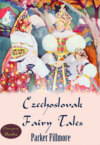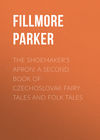Kitabı oku: «Czechoslovak Fairy Tales», sayfa 6
GRANDFATHER’S EYES
THE STORY OF THREE WICKED YEZINKAS
GRANDFATHER’S EYES
ONCE upon a time there was a poor boy whom everybody called Yanechek. His father and mother were dead and he was forced to start out alone in the world to make a living. For a long time he could find nothing to do. He wandered on and on and at last he came to a little house that stood by itself near the edge of the woods. An old man sat on the doorstep and Yanechek could see that he was blind, for there were empty holes where his eyes used to be.
Some goats that were penned in a shed near the house began bleating and the old man said:
“You poor things, you want to go to pasture, don’t you? But I can’t see to drive you and I have no one else to send.”
“Send me, grandfather,” Yanechek said. “Take me as your goatherd and let me work for you.”
“Who are you?” the old man asked.
Yanechek told him who he was and the old man agreed to take him.
“And now,” he said, “drive the goats to pasture. But one thing, Yanechek: don’t take them to the hill over there in the woods or the Yezinkas may get you! That’s where they caught me!”
Now Yanechek knew that the Yezinkas were wicked witches who lived in a cave in the woods and went about in the guise of beautiful young women. If they met you they would greet you modestly and say something like “God bless you!” to make you think they were good and kind and then, once they had you in their power, they would put you to sleep and gouge out your eyes! Oh, yes, Yanechek knew about the Yezinkas.
“Never fear, grandfather, the Yezinkas won’t get me!”
The first day and the second day Yanechek kept the goats near home. But the third day he said to himself: “I think I’ll try the hill in the woods. There’s better grass there and I’m not afraid of the Yezinkas.”
Before he started out he cut three long slender switches from a blackberry bramble, wound them into small coils, and hid them in the crown of his hat. Then he drove the goats through the woods where they nibbled at leaves and branches, beside a deep river where they paused to drink, and up the grassy slopes of the hill.
There the goats scattered this way and that and Yanechek sat down on a stone in the shade. He was hardly seated when he looked up and there before him, dressed all in white, stood the most beautiful maiden in the world. Her skin was red as roses and white as milk, her eyes were black as sloe berries, and her hair, dark as the raven’s wing, fell about her shoulders in long waving tresses. She smiled and offered Yanechek a big red apple.
“God bless you, shepherd boy,” she said. “Here’s something for you that grew in my own garden.”
But Yanechek knew that she must be a Yezinka and that, if he ate the apple, he would fall asleep and then she would gouge out his eyes. So he said, politely: “No, thank you, beautiful maiden. My master has a tree in his garden with apples that are bigger than yours and I have eaten as many as I want.”
When the maiden saw that Yanechek was not to be coaxed, she disappeared.
Presently a second maiden came, more beautiful, if possible, than the first. In her hand she carried a lovely red rose.
“God bless you, shepherd boy,” she said. “Isn’t this a lovely rose? I picked it myself from the hedge. How fragrant it is! Will you smell it?”
She offered him the rose but Yanechek refused it.
“No, thank you, beautiful maiden. My master’s garden is full of roses much sweeter than yours and I smell roses all the time.”
At that the second maiden shrugged her shoulders and disappeared.
Presently a third one came, the youngest and most beautiful of them all. In her hand she carried a golden comb.
“God bless you, shepherd boy.”
“Good day to you, beautiful maiden.”
She smiled at Yanechek and said: “Truly you are a handsome lad, but you would be handsomer still if your hair were nicely combed. Come, let me comb it for you.”
Yanechek said nothing but he took off his hat without letting the maiden see what was hidden in its crown. She came up close to him and then, just as she was about to comb his hair, he whipped out one of the long blackberry switches and struck her over the hands. She screamed and tried to escape but she could not because it is the fate of a Yezinka not to be able to move if ever a human being strikes her over the hands with a switch of bramble.
So Yanechek took her two hands and bound them together with the long thorny switch while she wept and struggled.
“Help, sisters! Help!” she cried.
At that the two other Yezinkas came running and when they saw what had happened they, too, began to weep and to beg Yanechek to unbind their sister’s hands and let her go.
But Yanechek only laughed and said: “No. You unbind them.”
“But, Yanechek, how can we? Our hands are soft and the thorns will prick us.”
However, when they saw that Yanechek was not to be moved, they went to their sister and tried to help her. Whereupon Yanechek whipped out the other two blackberry switches and struck them also on their soft pretty hands, first one and then the other. After that they, too, could not move and it was easy enough to bind them and make them prisoners.
“Now I’ve got the three of you, you wicked Yezinkas!” Yanechek said. “It was you who gouged out my poor old master’s eyes, you know it was! And you shall not escape until you do as I ask.”
He left them there and ran home to his master to whom he said: “Come, grandfather, for I have found a means of restoring your eyes!”
He took the old man by the hand and led him through the woods, along the bank of the river, and up the grassy hillside where the three Yezinkas were still struggling and weeping.
Then he said to the first of them: “Tell me now where my master’s eyes are. If you don’t tell me, I’ll throw you into the river.”
The first Yezinka pretended she didn’t know. So Yanechek lifted her up and started down the hill toward the river.
That frightened the maiden and she cried out: “Don’t throw me into the river, Yanechek, and I’ll find you your master’s eyes, I promise you I will!”
So Yanechek put her down and she led him to a cave in the hillside where she and her wicked sisters had piled up a great heap of eyes – all kinds of eyes they were: big eyes, little eyes, black eyes, red eyes, blue eyes, green eyes – every kind of eye in the world that you can think of.
She went to the heap and picked out two eyes which she said were the right ones. But when the poor old man tried to look through them, he cried out in fright:
“I see nothing but dark treetops with sleeping birds and flying bats! These are not my eyes! They are owls’ eyes! Take them out! Take them out!”
When Yanechek saw how the first Yezinka had deceived him, without another word he picked her up, threw her into the river, and that was the end of her.
Then he said to the second sister: “Now you tell me where my master’s eyes are.”
At first she, too, pretended she didn’t know, but when Yanechek threatened to throw her likewise into the river, she was glad enough to lead him back to the cave and pick out two eyes that she said were the right ones.
But when the poor old man tried to look through them, again he cried out in fright: “I see nothing but tangled underbrush and snapping teeth and hot red tongues! These are not my eyes! They are wolves’ eyes! Take them out! Take them out!”
When Yanechek saw how the second Yezinka had deceived him, without another word he picked her up, and threw her also into the river, and that was the end of her.
Then Yanechek said to the third sister: “Now you tell me where my master’s eyes are.”
At first she, too, pretended she didn’t know, but when Yanechek threatened to throw her likewise into the river, she was glad enough to lead him to the cave and pick out two eyes that she said were the right ones.
But when the poor old man tried to look through them, again he cried out in fright: “I see nothing but swirling waters and flashing fins! These are not my eyes! They are fishes’ eyes! Take them out! Take them out!”
When Yanechek saw how the third Yezinka had deceived him, without another word he was ready to serve her as he had served her sisters. But she begged him not to drown her and she said:
“Let me try again, Yanechek, and I’ll find you the right eyes, I promise you I will!”
So Yanechek let her try again and from the very bottom of the heap she picked out two more eyes that she swore were the right ones.
When the old man looked through them, he clapped his hands and said: “These are my own eyes, praise God! Now I can see as well as ever!”
After that the old man and Yanechek lived on happily together. Yanechek pastured the goats and the old man made cheeses at home and they ate them together. And you may be sure that the third Yezinka never showed herself again on that hill!
RATTLE-RATTLE-RATTLE AND CHINK-CHINK-CHINK
THE STORY OF LONG BEARD, THE DWARF, AND THE TWO SISTERS
RATTLE-RATTLE-RATTLE AND CHINK-CHINK-CHINK
THERE was once a poor man whose wife died leaving him a daughter. The little girl’s name was Lenka. She was a good little girl, cheerful and obedient and very industrious, and she did all she could to make her father comfortable.
After some time the man married again. His second wife also had a little girl just Lenka’s age. Her name was Dorla. Dorla was a lazy, ill-natured child, always quarreling and bickering. Yet her mother thought Dorla was perfect and she was always praising her to her husband.
“See what a good child my Dorla is,” she would say to him. “She works and spins and never says a cross word. Very different from your good-for-nothing Lenka who always breaks everything she touches and does nothing in return for all the good food she eats!”
She never stopped nagging and scolding her poor stepchild and complaining about her to her husband. Lenka was patient and went on quietly doing what was right, and she was always polite to her stepmother, and kind to her ill-natured stepsister.
She and Dorla used to go to spinning bees together. Dorla would play and waste her time and hardly fill one spindle. Lenka always worked industriously and usually filled two or three spools. Yet, when the two girls got home, the mother always took Dorla’s half-filled spindle and said to the father: “See what beautiful yarn my Dorla spins!” She would hide Lenka’s spools and say: “Your Lenka did nothing but play and waste her time!”
And before other people she talked the same way, pretending Dorla did everything that she didn’t do and saying that good industrious Lenka was lazy and good-for-nothing.
One night when the two girls were walking home together from a spinning bee, they came to a ditch in the road. Dorla jumped quickly across and then reached back her hand and said:
“My dear sister, let me hold your spindle. You may fall and hurt yourself.”
Poor Lenka, suspecting nothing unkind, handed Dorla her full spindle. Dorla took it and ran home and then boasted to her mother and her stepfather how much she had spun.
“Lenka,” she said, “has no yarn at all. She did nothing but play and waste her time.”
“You see,” said the woman to her husband. “This is what I’m always telling you but you never believe me. That Lenka of yours is a lazy, good-for-nothing girl who expects me and my poor daughter to do all the work. I’m not going to stand her in the house any longer. Tomorrow morning out she goes to make her own way in the world. Then perhaps she’ll understand what a good home she’s had with me!”
The poor man tried to defend Lenka but his wife would hear nothing. Lenka must go and that was all there was to it.
Early the next morning while it was still dark the woman started Lenka off. She gave her a sack that she said was full of good meal and smoked meat and bread. But instead of meal she put in ashes, instead of smoked meat straw, and instead of bread stones.
“Here is meal and smoked meat and bread for your journey,” she said. “You will be a long time finding any one who will be as good to you as I have been! Now be off with you and never let me see you again! Let your father put you out in service if he can!”
The poor man put his ax on his shoulder and started off with Lenka. He had no place to take her and he hardly knew what to do. He led her off into the mountains, where he built her a little two-room hut. He was ashamed to tell her that he was going to leave her alone, so he said to her:
“You stay here, my dear child, while I go farther into the forest and cut you some firewood.”
But instead of cutting her firewood, he hung his mallet on a beech tree and whenever the wind blew, the mallet made a knocking sound. All afternoon poor little Lenka hearing the knock-knock of the mallet thought to herself: “There is my dear father chopping wood for me!”
When evening came and he hadn’t returned, Lenka went out to find him, but all she could find was the mallet going knock-knock on the tree. Then the poor girl realized that her father had deceived her but she forgave him, for she knew that it was her stepmother’s fault.
She went back to the little hut to get her supper, but when she opened the sack her stepmother had given her, instead of meal and smoked meat and bread, she found only ashes and straw and stones. Then indeed did Lenka feel deserted and sitting down she cried with loneliness and hunger.
While she was crying an old beggar with a long beard came into the hut.
“God grant you happiness, my child,” he said.
“May He grant you the same, old father,” Lenka said, standing up and bowing politely.
“Thank you, my child, thank you. And now will you be so kind as to wash my face and give me a bite of supper?”
“Indeed, old father, I’d gladly wash your face and give you food, but there’s no water here and nothing to carry it in. And as for food, my stepmother filled the sack with ashes, straw, and stones.”
“That’s nothing, my child. Just go behind the hut and you will find a spring.”
Lenka went and there, sure enough, was a clear bubbling spring and on the ground beside it a bucket. She filled the bucket and carried it back to the hut.
As she entered the door she could hardly believe her eyes, for on the wall she saw a row of shining plates, big plates and little plates, and cups, and everything else that ought to be in a kitchen. The old beggar had started a fire, so Lenka at once put on water to boil.
“Look in the sack,” the beggar said.
Lenka untied the sack again and here it was full of fine meal and bread and smoked meat!
So now Lenka lost no time in preparing a good supper. Then she washed the old beggar’s face and hands and together they ate. After supper Lenka spread out her ragged clothes on the floor of the inner room and put the beggar in there for the night. She herself stretched out on the kitchen bench. It was a hard bed but Lenka made no complaint and presently she fell asleep.
At midnight there was a knocking at the door and a voice called out:
“A man am I
Six inches high,
But a long, long beard
Hangs from my chin.
Open the door
And let me in!”
Lenka jumped down and opened the door and there before her stood a tiny dwarf with a long beard. He was Long Beard who lived in the mountains and of whom Lenka had often heard stories.
He came in dragging after him a heavy bag of golden ducats.
“I was that old beggar,” he said, “whose face you washed and with whom you shared your supper. These ducats are to reward you for your kindness. Now go into your bedroom and lie down comfortably.”
As he said this he vanished.
Lenka went into her bedroom and there, instead of her few rags on the floor, was a fine feather bed and coverlets and a painted chest full of clothes. Lenka lay down on the feather bed and instantly fell asleep.
On the third day her father came, supposing by that time Lenka had either died of hunger or been devoured by wild beasts. At least, he thought, he would gather together her bones.
But when he reached the hut he rubbed his eyes in surprise. Instead of the rough hut, there was a pretty little cottage and instead of a handful of bones there was a happy girl singing away at her spinning.
“My daughter, my daughter!” he cried. “How are you?”
“Very well, dear father. You couldn’t have found a better place for me.”
She told him how happy she was and how pleasantly she passed the time, spinning and singing and working. Then she took a table-cloth and filled it with golden ducats and gave it to him.
So he went away very happy, thanking God for the good fortune that had come to Lenka.
As he neared home, the old dog that lay at the door said to the stepmother:
“Bow-wow, mistress, here comes the master. It’s chink-chink the money before him and chink-chink the money behind him!”
“Not so, old dog!” the stepmother cried. “It’s rattle-rattle bones before him and rattle-rattle bones behind him!”
Now when the man came into the cottage, he said: “Wife, give me a basket and let me empty this table-cloth.”
“What!” she cried. “Do you expect me to give you a basket for your daughter’s bones?”
But he began to chink the golden ducats and then she got a basket fast enough.
When she had all the ducats safely put away she said:
“Isn’t it just like you to find a place like that for your Lenka! But what have you ever done for my poor Dorla? Tomorrow you will take her out into the world and find a good place for her!”
So she got ready for Dorla a fine new bed and stylish clothes and as much good food as she could carry. The next day the man took Dorla out into the mountains and built her a little hut of two rooms.
Dorla sat in the hut and thought about the good supper she was going to cook for herself.
In the evening the same old beggar came and said to her:
“May God grant you happiness, my child. Won’t you please wash my face?”
“Wash your face, indeed!” cried Dorla in a rage. “This is what I’ll do to you!” And she took a stick and drove the old beggar away.
“Very well!” he muttered. “Very well! Very well!”
Then Dorla cooked herself a fine supper. After she had eaten every bite of it herself, she lay down on the bed and went soundly to sleep.
At midnight Long Beard knocked at the door and called out:
“A man am I
Six inches high,
But a long, long beard
Hangs from my chin.
Open the door
And let me in!”
Then Dorla was very frightened and she hid in the corner. Long Beard broke open the door and he caught Dorla and he shook her out of her skin. It served her right, too, for she was a wicked, spiteful girl and she had never been kind to anybody in her life.
Long Beard left her bones in a heap on the floor, and he hung her skin on the nail at the back of the door. Then he put her grinning skull in the window.
On the third day Dorla’s mother gave her husband a brand new table-cloth and said:
“Go now and see how my Dorla is getting on. Here is a table-cloth for the ducats.”
So the man took the table-cloth and went to the mountains. As he came near the hut, he saw something in the window that looked like grinning teeth. He said to himself:
“Dorla must be very happy to be smiling at me from this distance.”
But when he reached the hut all he found of Dorla was a heap of bones on the floor, the skin hanging on the nail behind the door, and the skull grinning in the window.
Without a word he gathered the bones into the table-cloth and started back.
As he neared home the old dog said:
“Bow-wow, mistress, here comes the master and it’s rattle-rattle before him and rattle-rattle behind him.”
“Not so, old dog!” cried the woman. “It’s chink-chink before him, and chink-chink behind him!”
But the old dog kept on barking and saying:
“No, no, bow-wow, it’s rattle-rattle before him and rattle-rattle behind him!”
In a rage the woman took a stick and beat the dog.
Then the man stepped into the cottage and at once his wife brought out a basket for the ducats. But when he shook out the table-cloth there was only the rattle-rattle of bones.
THE BIRD WITH THE GOLDEN GIZZARD
THE STORY OF TWO BROTHERS
THE BIRD WITH THE GOLDEN GIZZARD
THERE was once a poor man who had a large family. He was so poor that he had nothing to feed the children. For three days they had had no food. On the third day as the father was out cutting osiers he saw, sitting in a bush, a small bird that shone like gold.
“If I could snare that bird,” he thought to himself, “and take it home, the children would be amused and perhaps forget they were hungry.”
So he caught the bird and carried it home and, sure enough, the children were so delighted that for two days they didn’t cry for food.
On the third day the bird laid a golden egg. The oldest boy took the egg to the goldsmith to sell it. The goldsmith examined it and said:
“I don’t believe I have money enough to buy this egg.”
“Just give me some bread,” the boy said. “That will be enough.”
The goldsmith gave him two loaves of bread, one under each arm, and filled his pockets with golden ducats. So for once the whole family had all it could eat and still there was money left over.
Two days later the bird laid another golden egg which the boy carried to the goldsmith and sold for the same price.
Now the goldsmith had a son who said he would like to see this wonderful bird. So he went home with the boy. He looked the bird over very carefully and under its wings he discovered an inscription that no one else had seen. The inscription read:
Whoever eats my heart will become king.
Whoever eats my gizzard will find under his head each morning a heap of golden ducats.
The youth went home and told his father about the strange inscription. They talked the matter over and at last decided that it would be well for the young man to marry the poor man’s oldest daughter provided he could get the golden bird as dowry.
The goldsmith went to see the girl’s father and after some discussion the marriage was arranged.
The wedding day arrived. The bridegroom ordered the bird to be roasted and ready to be put on the table when the bridal party came home from church. It was his intention to eat the heart himself and have his bride eat the gizzard.
The children of the family cried bitterly at the thought of losing their pretty bird, but the bridegroom, of course, had his way.
Now two of the boys stayed home from the wedding and they decided that they would like very much to taste the roast bird if only they could find a piece that nobody would miss. They did not dare take a leg or a wing, but they thought it would be safe to pick out a morsel from the inside. So one boy ate the heart, the other the gizzard. Then they were so frightened at what they had done that they ran away and never came back.
When the bride and groom returned from church, the bird was carried to the table. The groom looked at once for the heart and the gizzard and was greatly shocked at their disappearance.
The two boys who had gone out into the world found work with a merchant. They slept together and every morning the merchant’s wife found a heap of golden ducats under the feather bed. She didn’t know to which boy they belonged. She took them and saved them for a whole year until they filled a hogshead.
At the end of a year the boys decided to go out again into the world. The merchant showed them all the ducats his wife had found in their bed and he said to them:
“Take with you as many as you want now and when you come back you may have the rest.”
The brothers parted company and each set out alone, the one to the left, the other to the right.
The younger brother came to a tavern. The landlady had two daughters who were so sharp at cards that they very soon won all the money he had. When he was picked clean he asked them to stop playing until the next morning when he would again have plenty of money.
Sure enough in the morning when he got up he had all the money he wanted. The girls asked him where it came from and he told them.
When they heard about the gizzard he had swallowed, they put something in his wine that made him sick at his stomach and he threw up the gizzard. The younger girl instantly snatched it, washed it, and swallowed it herself. Then as he had no more money they drove the poor boy away.
As he wandered in the fields he grew very hungry. He came to a meadow where he found a kind of sorrel that he ate. As soon as he ate it he turned into a goat and went jumping about the bushes nibbling at the leaves. He chanced to eat a kind of leaf that changed him back into himself.
“Ah,” he thought, “now I know what to do!”
He picked some of the sorrel and some of the other leaves and went straight back to the tavern. He told them there that he was bringing them a present of a new kind of spinach that tasted very good. They asked him would he cook it for them.
The cook tasted it and at once she turned into a goat. The serving maid came into the kitchen and when she saw a goat there she drove it out. The youth asked the maid would she like to taste the new spinach. She tasted it and immediately she turned into a goat. Then when the landlady and her two daughters tasted it they, too, turned into goats.
He fed the cook and the serving maid some of the other leaves and they turned back into themselves. But the other three he left as goats.
He made halters for them and then he hitched them up and drove off.
He drove on and on until he came to a town where the king was building himself a castle. Now this king was his brother who had eaten the magic bird’s heart. The king’s workmen were hauling stone for the new castle, so he decided to put his goats to work hauling stone. He loaded his cart heavier than all the other carts.
The king noticed him and recognized him and asked him where he got those goats. So he told the king the whole story. The king thought the goats had been punished long enough and begged his brother to have pity on them and restore them. He took the king’s advice and did so.
When they were once more human beings, he married the girl who had swallowed the gizzard. They soon became very rich, for every morning there was a heap of golden ducats under her head.






